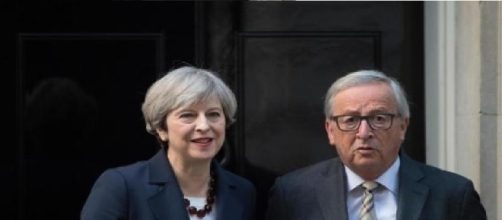A group of Conservative MPs have urged Theresa May to quit her negotiations with the EU as the Brexit Department gradually begins to favour a 'soft' Brexit.
22 Tory MPs have drafted a report describing a 'doomsday' scenario caused by disruption at ports and an economic crisis. This is despite a Brexit aide having to categorically deny a change of tone emerging from the Department for Exiting the EU. Insiders have revealed to The Guardian that there is a shifting mood of 'realism' towards the Government's 'have your cake and eat it' strategy.
'The Government is rethinking its approach.'
Many officials are considering the option of remaining inside the European Economic Area (EEA), which would result in a 'soft' EU exit at the expense of accepting European laws and the free movement of workers in exchange for tariff-free access to the EU's Single Market. Sources indicate this year's general election has caused the department to rethink the Lancaster House approach specified by the Prime Minister earlier this year, meaning economics would be prioritised over immigration controls.
However, the authors of the document urging the Government to prepare for the worst-case scenario have said the Brexit Department must prepare further contingency plans in the event of failing to negotiate a free trade agreement with the EU.
But the text says Mrs May should reach a deal that mirrors the Canadian-EU trade arrangement. The paper is called: 'Ready on Day One: Meeting the Brexit Borders Challenge', and was drafted by the Conservative MP for Dover and Deal Charlie Elphicke.
The paper says the Government should establish a border agency, build better transport links to all Channel ports and a viable customs system. This would result in the Thames Crossing project being built faster and the M20 lorry park at Stanford, Shepway, being delivered on time. Other proposed measures to ease the possible event of a 'hard' Brexit include an extension of the Le Touquet Treaty to cover customs co-operation and relations with France.
A Brexit Infrastructure Bill would be introduced to speed up road-building programmes by destroying long administrative processes.
'Two years is not ample time to negotiate a trade deal.'
Mr. Elphicke said two years is not ample time to negotiate a free trade deal for the EU and he urges the Prime Minister to listen to business leaders who fear there will be no deal. A spokesman for the Port of Dover welcomed Mr. Elphicke's report and said continued cooperation with France is essential to Britain's future.
Yet this advice flies in the face of what civil servants are preparing at the Department for Exiting the EU. One official said that whilst the department remains wedded to the Lancaster House approach, the reduction of a Tory majority last month means the Government's approach has been weakened.
Business leaders welcome the Government's re-evaluation of its Brexit strategy, saying that the EEA option would allow them to trade with Europe on a tariff-free basis whilst providing businesses with the opportunity to trade with countries beyond the continent. This could also result in Britain remaining a member of the EU's Customs Union.
'Businesses are regaining their voice.'
A senior official said businesses are regaining their voice after feeling pressured into supporting a 'hard' Brexit prior to June's general election. They said those who believe remaining in the EEA means selling your country short are being given a run for their money. They said Brexit Secretary David Davis will become more pragmatic as the negotiations unfold, listening to figures like Chancellor Philip Hammond, who is calling for a 'soft' EU exit.
A Brexit Department spokesman refuted the claims of a 'change of approach' to the Government's Brexit strategy, saying that they did not recognise the language being spoken by these officials. But the information highlighting an evolving mood in the department originates from officials at the highest levels of the Treasury and the Department for Exiting the EU.

